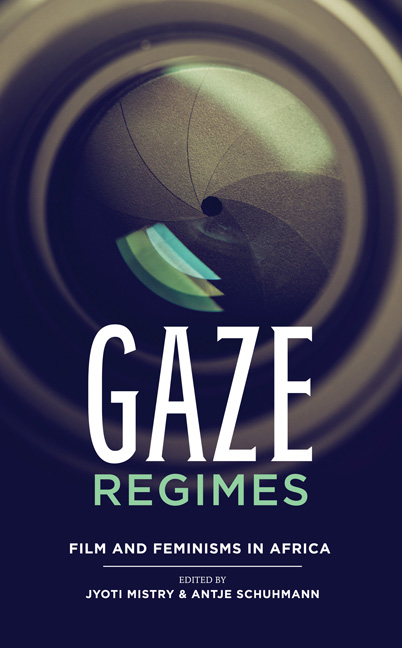Book contents
- Frontmatter
- Contents
- Acknowledgements
- Foreword: Goethe-Institut sub-Saharan Africa
- Introduction: By way of context and content
- 1 African Women in Cinema: An overview
- 2 ‘I am a feminist only in secret’
- 3 Staged Authenticity: Femininity in photography and film
- 4 ‘Power is in your own hands’: Why Jihan El-Tahri does not like movements
- 5 Aftermath – A focus on collective trauma
- 6 Shooting Violence and Trauma: Traversing visual and social topographies in Zanele Muholi's work
- 7 Puk Nini – A Filmic Instruction in Seduction: Exploring class and sexuality in gender relations
- 8 I am Saartjie Baartman
- 9 Filmmaking at the Margins of a Community: On co-producing Elelwani
- 10 On Collective Practice and Collected Reflections
- 11 ‘Cinema of resistance’
- 12 Dark and Personal
- 13 ‘Change? This might mean to shove a few men out’
- 14 Barakat! means Enough!
- 15 ‘Women, use the gaze to change reality’
- 16 Post-colonial Film Collaboration and Festival Politics
- 17 Tsitsi Dangarembga: A manifesto
- Acronyms and Abbreviations
- List of Contributors
- Filmography
- Index
5 - Aftermath – A focus on collective trauma
Published online by Cambridge University Press: 20 April 2018
- Frontmatter
- Contents
- Acknowledgements
- Foreword: Goethe-Institut sub-Saharan Africa
- Introduction: By way of context and content
- 1 African Women in Cinema: An overview
- 2 ‘I am a feminist only in secret’
- 3 Staged Authenticity: Femininity in photography and film
- 4 ‘Power is in your own hands’: Why Jihan El-Tahri does not like movements
- 5 Aftermath – A focus on collective trauma
- 6 Shooting Violence and Trauma: Traversing visual and social topographies in Zanele Muholi's work
- 7 Puk Nini – A Filmic Instruction in Seduction: Exploring class and sexuality in gender relations
- 8 I am Saartjie Baartman
- 9 Filmmaking at the Margins of a Community: On co-producing Elelwani
- 10 On Collective Practice and Collected Reflections
- 11 ‘Cinema of resistance’
- 12 Dark and Personal
- 13 ‘Change? This might mean to shove a few men out’
- 14 Barakat! means Enough!
- 15 ‘Women, use the gaze to change reality’
- 16 Post-colonial Film Collaboration and Festival Politics
- 17 Tsitsi Dangarembga: A manifesto
- Acronyms and Abbreviations
- List of Contributors
- Filmography
- Index
Summary
Djo Tunda Wa Munga and Rumbi Katedza both live in transitional (post-)conflict societies – the former in the Democratic Republic of Congo (DRC) and the latter in Zimbabwe – which impacts on how they make films and on the kinds of films they make. In recognition of their work and its considerable impact, both filmmakers were invited to deliver keynote addresses at the ‘Uber(w)unden (Art in Troubled Times)’ conference, which was convened at the Goethe-Institut in September 2011.
Prior to this meeting in 2011, we had occasion to meet Wa Munga for discussions at the Durban International Film Festival 2010, where he premiered his film Viva Riva! (2010) while Katedza was a participant in the ‘ARTSWork: Meeting of African Women Filmmakers’ in 2010 at the Goethe-Institut in Johannesburg.
Katedza is an accomplished filmmaker whose position in Zimbabwe has been twofold. Firstly, she has sought to use the medium as a way of interrogating representations of the political climate in her country. Secondly, she has used the medium to empower a new generation of Zimbabweans generally and women in particular. Her articles and short stories have been published widely. Her award-winning documentary The Axe and the Tree (2010) explores the processes of collective healing and community accountability for the perpetration of violence. The success of the film is its ability to represent the sometimes fine line between the survivors of violence and the perpetrators of violence.
After an anti-colonial civil war, Zimbabwe gained its independence from the British in 1980. The country suffered international sanctions in relation to its politics of land redistribution and, since the 1990s, has experienced growing internal opposition demanding freedom of speech next to other citizens’ rights, as well as the upholding of human rights. Internal conflict and violence have intensified further in the context of contested elections.
Wa Munga is also a highly skilled and award-winning filmmaker, whose film practice draws from a series of close observations of his social and political circumstances in the DRC. Wa Munga's debut feature film Viva Riva! has played at a number of international film festivals.
- Type
- Chapter
- Information
- Gaze RegimesFilm and feminisms in Africa, pp. 44 - 54Publisher: Wits University PressPrint publication year: 2015



